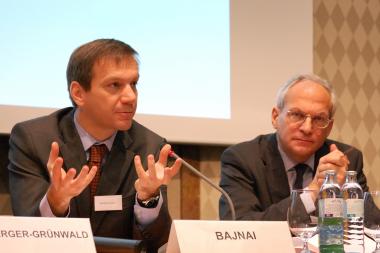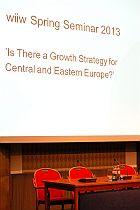wiiw Spring Seminar on Growth Strategy for Central and East Europe
22 March 2013
In March 2013, wiiw held its annual Spring Seminar where it presented its most recent research findings on CESEE.

From left to right: Gordon Bajnaj and Michael Landesmann
photo: Mario Holzner
The Central, East and Southeast (CESEE) countries are currently unable to replicate the growth rates observed prior to the 2008-2009 economic crisis. The relative scarcity of previous sources of growth, such as foreign capital (including foreign direct investment), in the present circumstances is raising the issue of an alternative growth model for the region. The search for such a new model of economic growth and convergence has been the central topic of this year’s wiiw Spring Seminar. Among the issues addressed at the seminar have been the current situation and the near-term prospects for the CESEE countries, the experience with the euro adoption in the three countries of the region which are members of the euro area (Slovenia, Slovakia and Estonia) in comparative perspective, and the potential role of industrial policy and transfers from the EU budget in fostering economic growth.
The discussion furthermore benefited from two distinguished keynote speakers who highlighted the current challenges for the region from a national and an international perspective. Mr. Gordon Bajnai, the former Prime Minister of Hungary in 2009-2010, shared his view of the major challenges for the New EU Member States, with a particular emphasis on the situation in Hungary. Ms. Deborah Revoltella, the Director of Research at European Investment Bank (EIB), gave insight into the financial constraints on the economic recovery in the region. Finally, Ms. Jarmila Urvova, Economist at the Oesterreichische Nationalbank (OeNB), presented her recent research on the sustainability of public debts in the CESEE countries.
We gratefully acknowledge the sponsoring of the Spring Seminar by Oesterreichische Nationalbank (OeNB).
